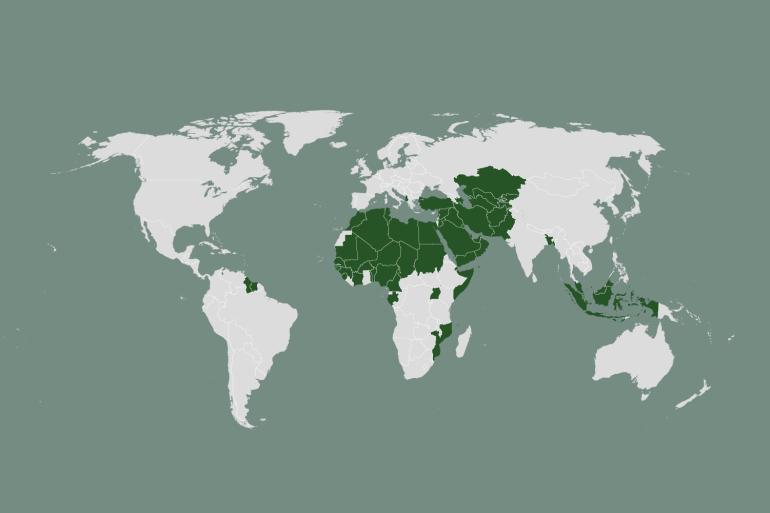Map of the 57 Members of the Organisation of Islamic Cooperation


Marcus Rodriguez
Historical Geography Expert
Marcus Rodriguez specializes in historical cartography and geographic data analysis. With a background in both history and geography, he brings unique...
Geographic Analysis
What This Map Shows
This map provides a comprehensive visualization of the 57 member states of the Organisation of Islamic Cooperation (OIC), which is an important intergovernmental organization founded to promote cooperation among its member countries in various fields including politics, economics, culture, and social issues. The OIC is notable for being the second-largest intergovernmental organization after the United Nations, representing a significant portion of the Muslim world. The countries are predominantly located in regions such as the Middle East, North Africa, Sub-Saharan Africa, South Asia, and Southeast Asia.
Deep Dive into the Organisation of Islamic Cooperation
The Organisation of Islamic Cooperation was established in 1969, primarily to safeguard and protect the interests of the Muslim world in the spirit of promoting international peace and harmony. One of the most compelling aspects of the OIC is its sheer diversity. The member states encompass a wide range of cultures, languages, and political systems, with populations totaling over 1.8 billion people, which is nearly a quarter of the global population.
Interestingly, the OIC aims to foster unity among its members, which can sometimes be a complex task. For instance, the organization includes countries like Indonesia, the most populous Muslim-majority nation, alongside smaller states like the Maldives. This diversity also extends to the economic status of member countries, ranging from wealthier nations like Saudi Arabia and the UAE, to developing countries like Afghanistan and Bangladesh.
Moreover, the OIC plays a significant role in addressing issues that affect the Muslim world, such as the Palestinian cause, humanitarian crises, and the promotion of peace and security in conflict zones. The organization has held numerous summits and meetings to discuss these pressing issues, attempting to create a united front on matters of mutual concern.
The OIC has also taken steps towards economic collaboration, although this remains a work in progress. The establishment of the Islamic Development Bank aims to facilitate economic development and social progress in its member states. Furthermore, various initiatives have been put in place to enhance trade among OIC countries, which is crucial for economic stability and growth in a region that faces numerous challenges.
Regional Analysis
Analyzing the map, we can see that the OIC members are clustered in specific regions, each with its own unique characteristics. In the Middle East, countries like Saudi Arabia, Iran, and Egypt play influential roles in regional politics and economics. These nations often lead discussions within the OIC, especially concerning issues like security, energy, and economic cooperation.
In contrast, Sub-Saharan Africa presents a different landscape. Countries such as Nigeria and Senegal are not only notable for their population but also for their rich cultural diversity and complex political environments. The OIC seeks to address the unique challenges faced by these nations, including poverty, education, and health issues. Interestingly, the involvement of African members in the OIC highlights the increasing recognition of the importance of Africa in global Islamic affairs.
South Asia, with Pakistan and Bangladesh as significant members, adds another layer of complexity. These countries deal with their own socio-political challenges, such as extremism and economic disparities. The OIC has worked to provide a platform for dialogue among these countries, encouraging cooperation on security and economic development.
Significance and Impact
Understanding the dynamics within the Organisation of Islamic Cooperation is crucial, especially in today's interconnected world. The OIC not only serves as a platform for member states to collaborate but also acts as a voice for the Muslim community on the global stage. As global issues like climate change and economic inequality continue to evolve, the role of the OIC in addressing these challenges becomes increasingly significant.
Moreover, the geopolitical landscape is shifting, and the importance of the OIC could grow as new challenges emerge. For example, the impacts of globalization and technological advancements are reshaping economies and societies within OIC member states. The organization’s ability to adapt and respond to these changes will be vital for its relevance in the coming decades.
In conclusion, the Organisation of Islamic Cooperation represents not just a coalition of countries, but a tapestry of cultures and experiences. Its members face both unique and shared challenges, and their cooperation through the OIC holds the potential for significant progress in achieving peace, security, and prosperity across the Muslim world and beyond.
Visualization Details
- Published
- September 15, 2025
- Views
- 62
Comments
Loading comments...